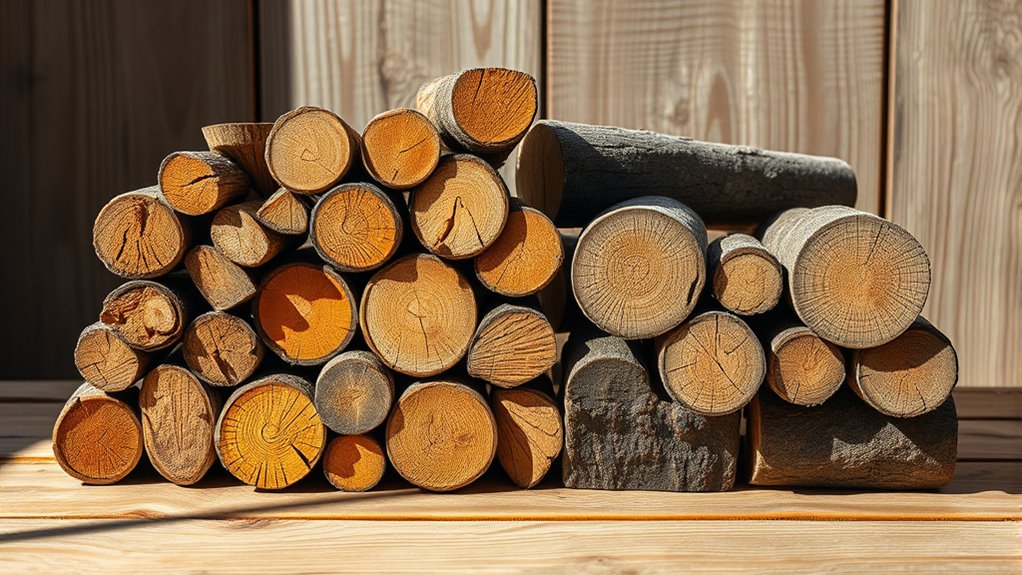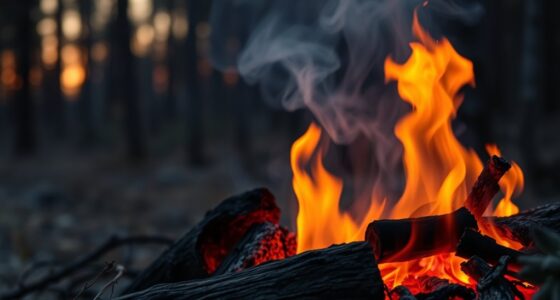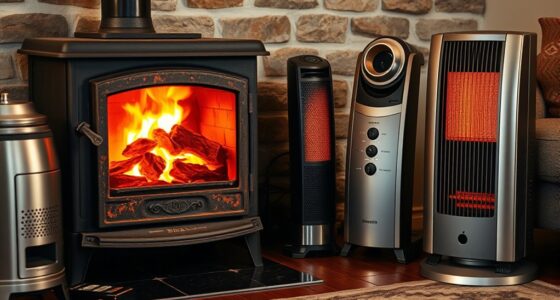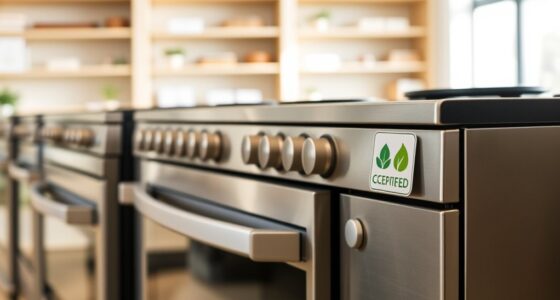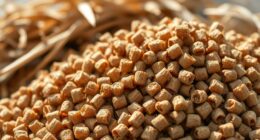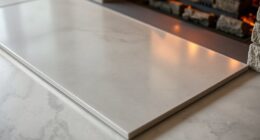Wood briquettes and compressed logs are a sustainable choice because they use renewable wood waste, reducing overall waste and emissions. They burn more efficiently with less ash and pollutants, helping you lower your carbon footprint. Locally produced, they support regional economies and cut transportation emissions. Responsible sourcing and sustainable forestry practices ensure they promote a healthy environment. To discover more about how these eco-friendly options can benefit your heating needs, keep exploring further.
Key Takeaways
- Made from wood waste, reducing environmental impact and promoting waste reuse.
- Burn cleaner with fewer emissions, supporting lower greenhouse gases and air pollution.
- Typically produced locally, minimizing transportation emissions and supporting regional economies.
- Sustainably sourced to preserve forests, promote responsible harvesting, and maintain biodiversity.
- Support eco-conscious heating by utilizing renewable, responsible wood resources aligned with environmental goals.
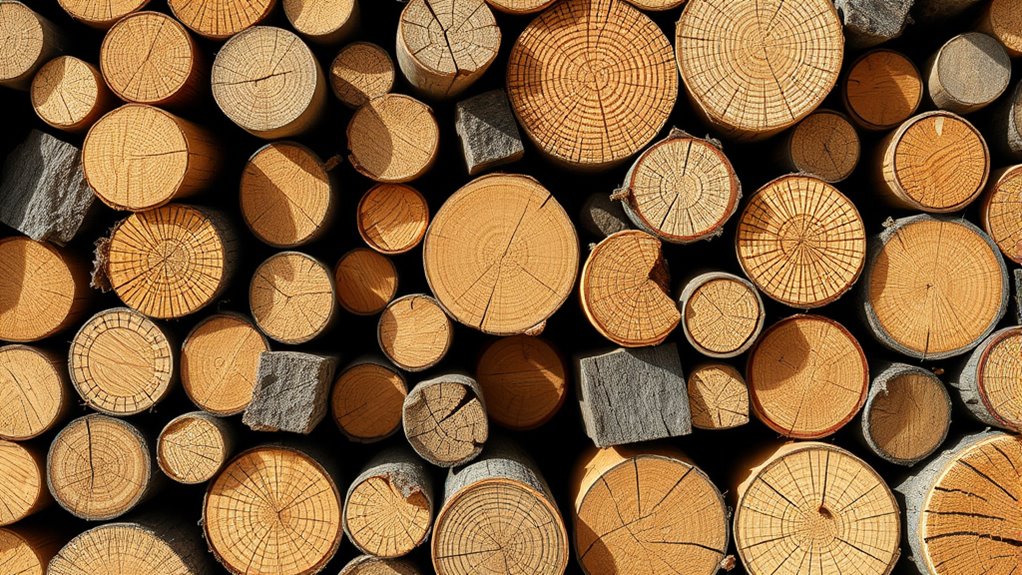
Wood briquettes and compressed logs are popular alternatives to traditional firewood, offering a cleaner and more efficient way to heat your home. These products are increasingly favored because they harness renewable energy sources, making them a more sustainable choice for eco-conscious homeowners. Unlike conventional firewood, which often involves cutting down trees and transporting bulky logs, briquettes and compressed logs are made from compressed sawdust, wood shavings, or other wood waste. This process maximizes resource use and minimizes waste, helping you reduce your overall environmental impact. By choosing these options, you contribute to lowering your carbon footprint, as they emit fewer pollutants and greenhouse gases during combustion compared to traditional firewood.
Wood briquettes and compressed logs are eco-friendly, efficient alternatives to traditional firewood, reducing waste and lowering your carbon footprint.
One of the key advantages of wood briquettes and compressed logs is their consistency. They burn more evenly and produce less ash, which means less cleaning and maintenance. This efficiency means you get more heat from less fuel, making them cost-effective in the long run. Plus, because the manufacturing process compresses the wood waste without additives or binders, these logs are considered a cleaner-burning option. This reduces the release of smoke, tar, and volatile organic compounds, further decreasing your home’s environmental impact and improving indoor air quality.
Another sustainability benefit is that these briquettes and logs are often produced locally, supporting regional economies and reducing transportation emissions. Since they are made from wood waste, they utilize by-products that would otherwise go to waste or be burned improperly, contributing to pollution. Using such renewable energy sources aligns with global efforts to transition away from fossil fuels. When burned, wood releases carbon dioxide, but because the trees used are part of a natural cycle of growth and decay, this carbon release is considered part of a balanced cycle, especially when sourced sustainably.
In addition, many manufacturers now follow sustainable forestry practices, ensuring that the wood used is harvested responsibly. This commitment to sustainability helps preserve forests and promotes environmental stewardship. Implementing reliable merchant services and adopting secure payment methods can further support environmentally responsible purchasing and distribution systems. When you opt for wood briquettes and compressed logs, you’re supporting a system that promotes efficient resource use and reduces reliance on non-renewable energy sources. These options make it easier for you to stay warm and comfortable while making environmentally responsible choices, ultimately helping to reduce your overall carbon footprint and support renewable energy initiatives.
Frequently Asked Questions
Are Wood Briquettes Suitable for Indoor Fireplaces?
Yes, wood briquettes are suitable for indoor fireplaces if you prioritize indoor safety and air quality. They burn cleaner than traditional logs, producing less smoke and ash, which helps maintain better air quality inside your home. Just make certain your fireplace is well-ventilated and follow safety precautions to avoid indoor hazards. Using high-quality briquettes also reduces the risk of creosote buildup, making your indoor fire safer and more efficient.
How Long Do Compressed Logs Typically Burn?
Compressed logs typically burn for about 1.5 to 3 hours, depending on their size and composition. You’ll find that they ignite quickly, with an average ignition time of around 5-10 minutes, and produce minimal ash content. To get the most burn time, guarantee proper stacking and airflow. Keep in mind, larger logs tend to burn longer, making them a practical choice for extended heating.
Can I Use Wood Briquettes in All Types of Stoves?
Using wood briquettes in all types of stoves is like fitting a key into every lock—it’s not always compatible. While many stoves designed for solid fuels can handle briquettes, some older or specialized models may not. As an alternative fuel, briquettes can boost heating efficiency, but always check your stove’s manufacturer guidelines first. Otherwise, you risk damage or reduced performance, much like forcing a square peg into a round hole.
Do Briquettes Emit More or Less Smoke Than Traditional Firewood?
Briquettes emit less smoke than traditional firewood, helping improve air quality and reducing harmful emission levels. Since they are more densely packed and burn more efficiently, they produce fewer particulate matter and volatile organic compounds. This means you’ll enjoy cleaner air indoors and outdoors, making briquettes a more environmentally friendly option. Using them can markedly lower your home’s pollution footprint while maintaining a warm, cozy fire with less smoke.
Are There Any Safety Concerns With Storing Compressed Logs?
Storing compressed logs is like guarding a treasure chest—you need caution. They pose a fire hazard if not stored properly, so always keep them in a cool, dry, well-ventilated area away from heat sources. Follow storage precautions, such as stacking neatly and avoiding exposure to moisture or flames. This guarantees safety and prevents accidental ignition, keeping your home secure and your logs ready for a cozy fire when needed.
Conclusion
Just like the eternal flame of Prometheus lighting the way, wood briquettes and compressed logs illuminate a sustainable path forward. By choosing these eco-friendly alternatives, you’re not only fueling your home but also safeguarding the planet for future generations. Embrace the power of responsible energy, and let your choices echo the wise words of those who knew the importance of harmony with nature. Together, you can ignite a greener, brighter tomorrow.

